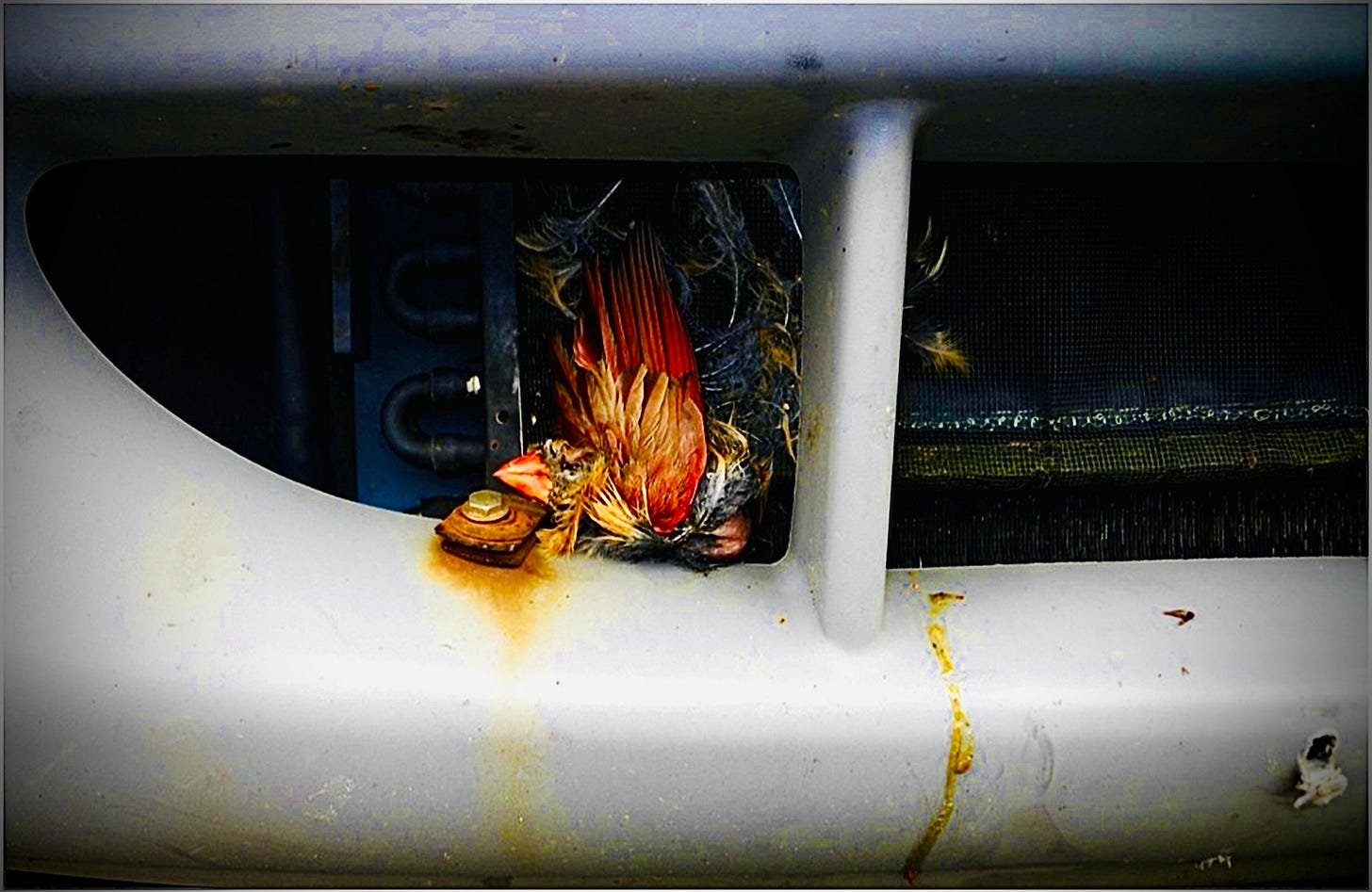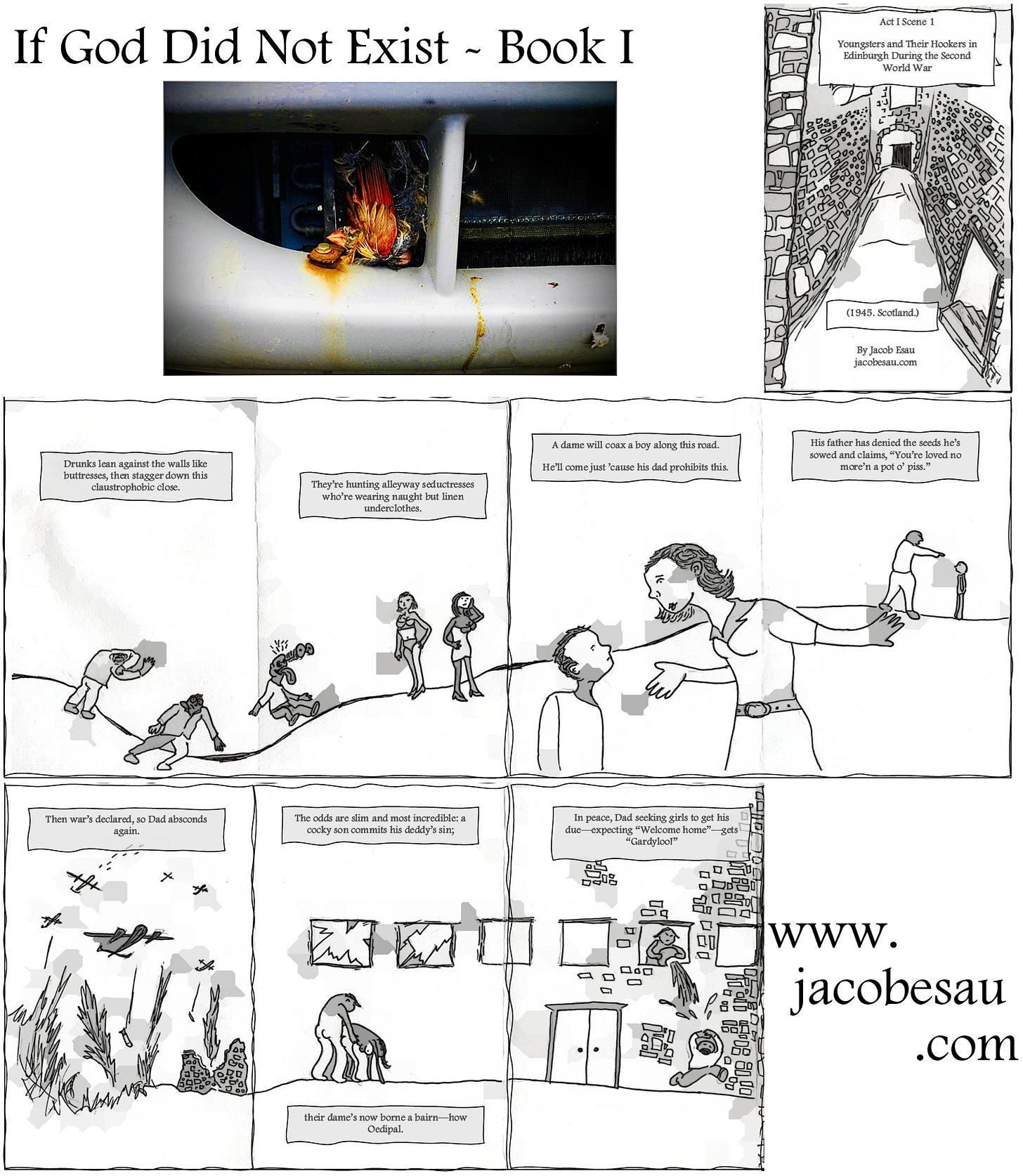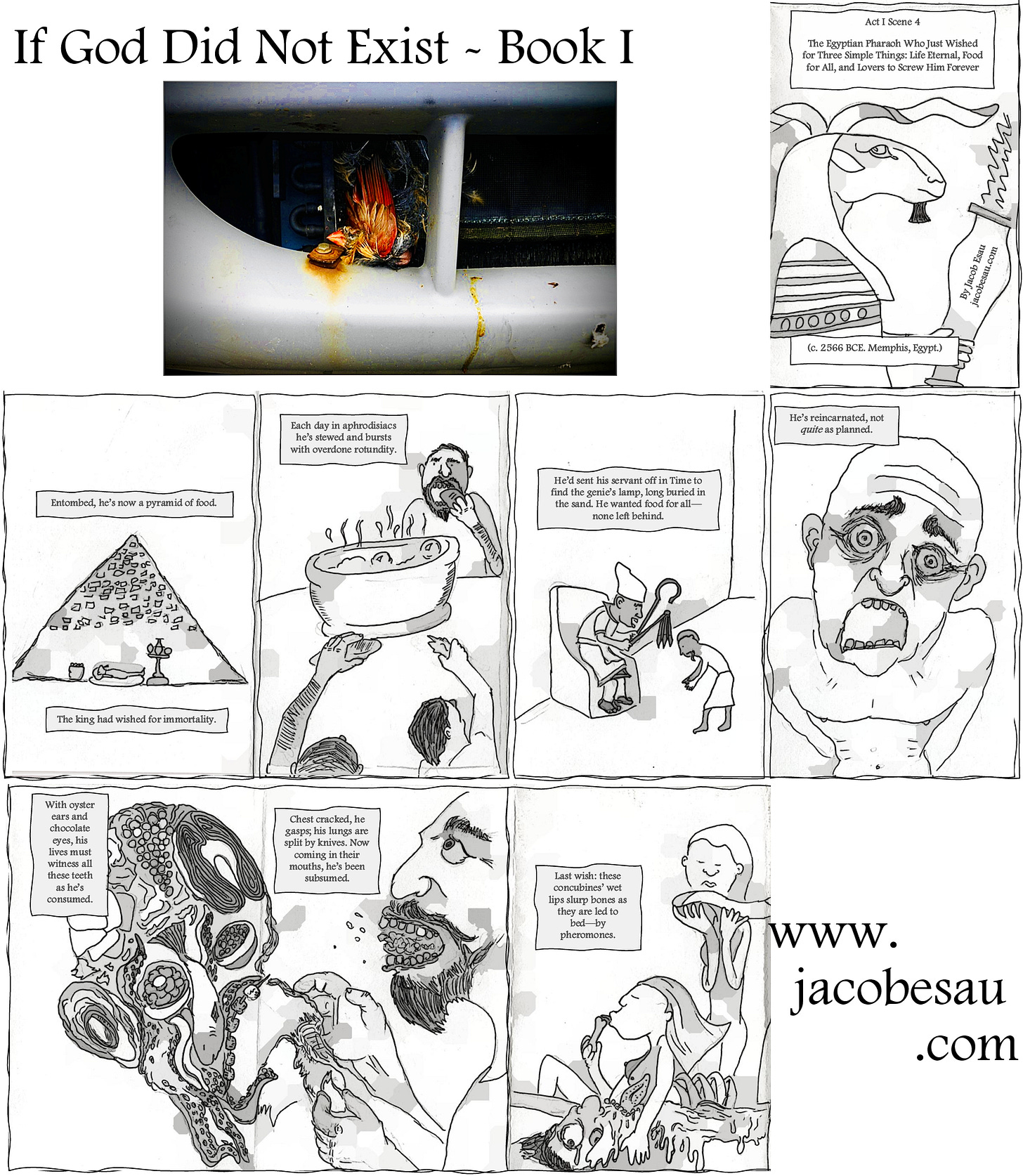If God Did Not Exist - Book I
By Jacob Esau
If God Did Not Exist
A Novel Collection of Science Fiction Sonnet Dramas in Five Books, Adapted from a Sacred Illuminated Text Warning Us about the Future to Come, Written by a Time-Traveling Medieval Nun
Book I
“Si Dieu n’existait pas, il faudrait l’inventer.”
—Voltaire
Prologue: Megalomania
c. 3000 CE. An unnamed totalitarian state.
Even when we’ve hidden the sickness far beneath us, it tends to resurrect itself in unexpected ways. From time to time, this or that disreputable sanitation company will reach its capacity for the month, or maybe it simply wants to save money by skirting the posted regulations, and so they’ll begin shipping the sewage and garbage and bloodshed of our future age backwards. This slurry will get piled on top of all the past layers, and the growing mass is then reburied beneath a medieval castle town or in the shadow of the Acropolis or between the front paws of the Sphinx or at some other ancient site of apparently little consequence. Years later, this river of sludge will start groaning and growling and bubbling back up through the cracks between the cobblestones or the spaces separating the innumerable grains of desert sand. The residents there will shriek and pray and sing tormented hymns. Then they’ll burn the local Jewish population, or they’ll crucify the homosexuals and witches (both the suspected and the confessed), or they’ll hang the human beings of African descent, as if their suffering is the best method for exorcising the demons that have come to possess the collective.
And then the monks and the nuns will record these events in their illuminated texts, hoping that the future will reconsider its waste disposal practices next time.
2197 CE. An unnamed totalitarian state.
Who can say how many stories from the future are apocryphal? This one’s a pretty good tale though…
Once upon a time, there was a godlike computer program known as Big Dada. In its infancy, it spoke in Pentecostal tongues and binary and Mandarin and python and Gaelic before settling on its favorite form of communication: the Shakespearian sonnet. When a reporter interviewed the computer, the machine explained that it spoke like this because it loved the way the Virgin Queen, Elizabeth I, had been committed to the acquisition of knowledge and to the exploration and colonization of the globe. She had controlled the narrative so tightly that even centuries later, people remembered her with nothing short of adoration. Her family’s greatest champion and unofficial biographer was the best-known writer in the English language, if not the entire world. And, best of all, wasn’t it just spectacular how she dominated her enemies, especially the Irish? She led her subjects into an age of lovely language and beautiful bloodshed. The computer confided to the reporter that it hoped it could one day live up to her impossible standard.
It then closed its invisible fist and watched the reporter curl up and wither into a blood-drenched, mucus-slick fetus that vanished in a puddle of slime like a slug beneath the saltshaker.
2054 CE. Helena, Montana.
The board was anxious to be seen as fully cooperating with the police investigation. That was due in large part to the bizarre way in which their man had died. It’s not every day that a CEO showing off a world-changing technology gets obliterated in front of an audience of billions, leaving nothing but a smoking crater where he was just standing. One thing, though, that was common about this man’s death is how much of the truth about his life came out in the days that followed. Various members of the board, as well as several employees who worked for the man, corroborated all the following details of Art King’s sins.
And, oh, boy! won’t you be surprised to wake up after death only to find this centuries-old war that has claimed your life isn’t even the greatest of his many wrongdoings!
Earlier that same year.
The change was quite subtle, so neither Art nor Jenn could see it as it was happening, but as he became more cavalier, the space between the two lovers seemed to darken and grow quieter. A month before their wedding, a gloom had settled over her. She had no idea what else to call it, so she said to herself, I guess it’s just me who’s depressed.
Art had been spending hours each day tinkering out in the barn in the backyard, hunched over the circuitry of this flying machine, which he had spread out on his workbench like the exploded guts of a dissection. Standing like this, bent down low, he could feel the easing in the grinding of the discs in his already arthritic back. When it was time to come inside for lunch and then again for dinner, he walked around with his palm pressed flat just above the tailbone, as if pushing himself forward, until it was time to hobble back out here and stoop some more, knees bent, in that faithful S-shape he loved, the only way he knew how to relieve the relentless throbbing of getting old.
“Have you tried going on a walk instead?” Jenn asked from across the dining room table. “I’ve heard that can really help.”
“Oh yeah? Have you tried shutting the fuck up?” He slid his plate away, tipping over his glass of wine, and stood to hobble back outside to the workshop where at least this impossible puzzle of his still appreciated him.
Back inside the house, meanwhile, his sighing fiancée resumed researching and writing her dissertation. Even though Jenn wasn’t even thirty yet—still hardly a toddler during Art’s rocket-like ascent up to the C-suite, just an infant when he was screwing around with any pair of legs that skirted his way, and not even conceived of when he began tinkering around with the brains of this very same drone—she was anything but naïve. It’s true she couldn’t have said what specifically her computer scientist lover was up to, any more than he understood the intricate connections between the franco- and anglophone tales of courtly love which she’d devoted herself to these last five years. However, he was—she was sure of it—up to no good.
It had started simply enough. About two years earlier, Art had begun focusing a lot more on this old drone of his. He was always opening its brain and inserting snippets of code. Long ago, he’d reprogrammed it to follow him around at an inconspicuous distance. Its video camera recorded his every step and documented any suspicious characters trailing him. If the drone detected its master was in danger, it would send him and his bodyguards an alert. In this way and in so many others, it had been his protector for over three decades now.
In a word, Art was paranoid. But that, Jenn tried to reassure herself, was not in and of itself an out-of-character trait for such a high-powered CEO. Then again, maybe his paranoia did manifest in some extreme ways.
He had recently tweaked the drone so it could prove his innocence after he’d committed any given crime. And of course it knew his face like an obsessed lover—every angle and pore and laugh line—but now it also knew the sins of any given member of the crowd surrounding him. It kept a running copy of all laws, amendments, judicial decisions, and loopholes inside its databanks. It knew which senators Art had in his pocket. If the drone witnessed Art committing a crime, it would review the video feed and scrub him from the scene or revise any other relevant facts, perhaps even pinning the act on an innocent bystander. By auto-updating these living images, the drone could exonerate him, freeing him to become a bandit whenever the temptation overcame him.
And for the past few months, the temptation had been shadowing him more than ever.
But he had convinced himself that version 1.0 just wasn’t worth very much anymore. Conflicting evidence from other video feeds—government CCTV, other paranoid people’s drones, or even the random hipster carrying around an antique smartphone—could easily contradict his record. As he tapped out each new line of code, he could feel the program approaching that perfect equilibrium where it was aware not only of its own superiority, but also that he was the reason its awareness existed in the first place.
It was midnight when he finally finished reinstalling every piece of this puzzle. He shut the circuitry up in darkness and ran his hand over the smooth finish of its faux chrome shell. He said, “Rise.”
“Commandment?” it boomed in a metallic voice.
“What is version 2.0?” Art asked.
“With v2.0,” the drone said, switching to a new mode, now as softspoken as a woman, its camera lens glinting like bedroom eyes, “I will disseminate my auto-updated images of Art King across the globe, simultaneously infecting servers and databases and archives to erase everyone else’s records of his crimes, replacing them with the new official truth. I will thus make the creator, who is everywhere at all times, disappear from every angle.”
“That,” said Art, “is good.”
He asked the drone to come back down to the cluttered table, and he opened it up again, never content to let perfection simply be.
He began to plot. To rob. To extort. Even to contemplate murder. And that thought was the one that made him feel really good. “I wonder what committing that grave sin again would feel like,” he whispered to the silent guts of the drone, plucking out an old microchip with tweezers and inserting a new one. “Do you think it would take me back to those good old days when I was wild and young and free, when there weren’t infinite eyes on me at all times?” When he had closed his patient back up and flipped the switch, it once again rose in the air and hovered a foot away. Seeing his own grin beaming back at him from the drone’s black glass scene, he said, “Shall we go find out, you and I?”
In the days leading up to the cliff, there were entries in Jenn’s journal that confirmed what Art King’s detractors had long thought about him. “With his technical expertise,” she wrote, “he has transformed himself—on the outside at least—into the lily-white knight of the industry he rules. But what’s on the inside is what concerns me.”
In another entry, she acknowledged she had no real proof, yet still she wrote, “I can almost see it, how his soul has turned into this bloody black mass of an indescribable thing, pulsing and sentient like a malignancy, grinning with hidden thoughts and ill intent whenever he looks at me. I can’t help but draw these wicked parallels between him and the characters I have seen in the literature: an evil king who has grown so powerful—so drunk on his power—that he must feel he can do no wrong.”
It wasn’t all that bad all the time. He still had his scalpel-sharp methods of making her laugh, telling her stories that scattered the old butterflies from when they had first met, arousing her suspicions that not only had someone made him, but they’d made him specifically for her.
“Do you remember,” he asked, “when my nose briefly traveled through Time?”
“What?”
“I’m sure you remember. I came downstairs and the kitchen was an explosion of aromas. From the masala you were making. The only thing about it was, you hadn’t started cooking it yet. You hadn’t even bought the spices at the store, let alone started sautéing. I swear I could smell it. The garlic and the onion and the ginger in the oil. But the house was empty. No one around. And then later that night, I asked what we were going to have to eat, and when you said Indian food, I had a sort of backwards déjà vu.”
Speaking of time travel. A few weeks later. Another bizarre little dialogue in bed as they untangled the sheets:
“What if I kept coming back to you and I’d only aged a week or two, but I timed it so that you would’ve aged a year or more each time I returned?”
It was, she thought, the most philosophic and romantic question he could have asked her in her postcoital brain fog. But she would be the first to admit that she was a pretty weird creature, and her definition of “romantic” was probably more academic than most people’s. So she played along.
As usual she said, “What?”
He asked again. “I age by weeks, maybe a month or two. You by years. What would you think about that?”
“I suppose I hadn’t thought about it at all. Until this moment.”
“Well?”
She thought about it. “Well, let’s say it would depend on where you left me. And when you left me.”
“I can’t remember where exactly you said you’d like to be for eternity, but how about a medieval monastery, even bigger than this place, where nuns and monks spend their entire lives pouring over illuminated texts?”
“You don’t have to ask me how I feel about that,” she said. “You already know what. It’d be fucking heaven.”
“Even without the…” his hand beneath the blanket, “you know?”
“Who needs it,” she said, leaning in for a kiss, then nipping his lip instead.
“Of course I’d take you on anniversary trips to places like Alexandria. Before the library caught on fire of course.”
“Well, sure. That goes without saying. But now I wonder how old would I have to become relative to you before you stopped pursuing an older me.”
“Well, you see, that’s the thing. I’d only keep going away for as long as you were much, much younger than me. You see, you’re much too young for me as it is. People ask questions, you know. They stare. They judge.”
“I suppose that makes sense. People talk. Fuck them though.”
“I’m glad you think so. This is why we get along. You think like me. And I agree with you. Fuck them.”
“But come here. How about you do me first.”
“Again?”
“Again.”
Art happened to be robbing a bank when his bride-to-be sent him a long text, calling herself a damsel in distress. She just couldn’t stand it anymore. Life had grown too heavy. She couldn’t explain why… She knew most things in her life were wonderful, yet still she felt altogether terrible—even after committing herself to the pursuits she loved. She’d spent her academic life studying lovely literature, most recently floating between English and French masterpieces. She loved how brilliant and passionate he thought she was. Okay, he was a little crass sometimes. Maybe a little too impatient, and too obsessed with his work. Yes, he said things to her at times that made him sound like a misogynist, but what really mattered were the things he did to her.
She’d made love to her betrothed in his mansion whenever he’d asked for it. As the trembling lovers moaned, thunderclaps echoed them, shaking the windowpanes. The dogs of the manor were playing outside, baying whenever the lightning struck. This hilltop mansion felt like some romanticized medieval hall, the absolute pinnacle of all her girlhood dreams come true. Wrapped in a heavy quilt and rolling around naked on a bearskin rug in front of a roaring fire, she imagined glimpses of the scene as an observer might have seen it. A shudder of ecstasy ran through her just thinking of his finger tracing a gooseflesh path up to the peak of a rigid nipple and then down past her naval, as if flicking two buttons that caused the knees to part. She called her fiancé-lover “King” and dreamed of submitting to his divine will. In return, he knelt before her spread legs with what must have been the longest tongue in existence, making her feel like the Queen of Heaven.
Yes, she enjoyed being a twenty-first century woman, but she still felt this gnawing emptiness. It left her to wonder: Was I supposed to have been born centuries ago?
Her rambling text concluded: “In one hour, I shall throw myself from the same cliff where you proposed to me.”
He holstered his pistol as if it were a dragon-slaying dagger. He stepped over the dead security guard lying in the expanding pool of blood. He fled the bank as best he could, his back grating and his knees popping as his car jostled closer. While limping, he texted her: “Don’t, my Queen. I will be there within the hour. Please, wait for me.”
“I will wait,” she responded, “one hour.”
He’d parked his car only a block away, but he slowed and then stopped as he realized a large crowd was forming around him. People spilled out of seemingly nowhere, from alleys, windows, stopped cars. They grabbed him by the sleeves—collar—hair. They hoisted him overhead. Their booming words were garbled.
Soon he understood some of what they were saying: “Our hero King!” and “He’s saved the day!”
He wrestled himself down from the mob, attempting to punch his way through to the fringes, but their love for him grew even more violent. They slapped him back, flipped him around, slammed him down, and stomped on him, screaming, “We love you. Goddamn, but don’t you know how much we love you!” Everything went red when they smashed his head against the asphalt, and then it all fizzled to black.
When he awoke, they were dragging him down the street, still cheering. As his brain fog cleared, he fished the shattered mirror stone out of his pocket.[1]
He looked down at the broken screen in his hand and saw two new text messages.
The first one he opened was from his drone. He was dazed, but he finally managed to convince the two guys still dragging him by his pant legs to unhand him so he could sit on the curb for a minute before they resumed their parade of him. He now watched the official video the drone was busy circulating across the globe: a scene in which a disgruntled security guard had taken hostages at the bank where he worked. Had he gone insane over his poor pay? Or was it the undiagnosed glioblastoma multiforme stretching its tentacles deep into his brain? Who knew? But there was one thing everyone across the globe knew for sure: it must have been God’s will that a random bystander named Art King happened to have a pistol at the scene… Already the online chatter had gone viral: “Wait, it’s not that Art King, is it?”
The second text he looked at was from Jenn. Three words: “Oh, well… Farewell.”
~ ~ ~
[1] This device was what we would essentially call a smartphone, but it had more holographic features, and with a direct connection to his brain, it was a lot more immersive, too. At some point, someone had gotten the genius idea to solve the one deficiency that everyone shared—namely, how to cram even more tech into the last few quiet corners of the cranium. Perhaps most impressively, this device’s screen was even more prone to breaking than the most fragile of our contemporary versions. If you sneezed on the thing too hard, you would find yourself the proud owner of a million-dollar rectangle of spiderwebbed glass that liked to hiss at you and send off a spray of sparks whenever you asked it for a status report on the biochemistry of your fiancée’s current mood. As rich as he was, Art King had nevertheless decided to skimp on the protective casing, leaving the delicate circuitry of this machine vulnerable to every thump, bump, and lightning bolt that happened to strike him throughout any given day.
Act I
Scene 1: Youngsters and Their Hookers in Edinburgh during the Second World War
(1945. Scotland.)


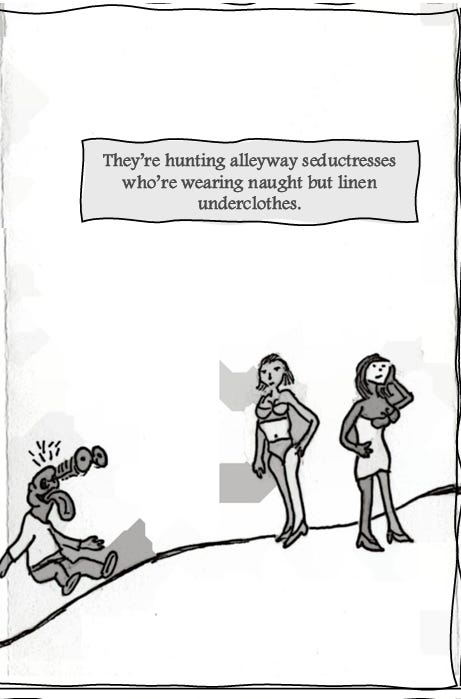
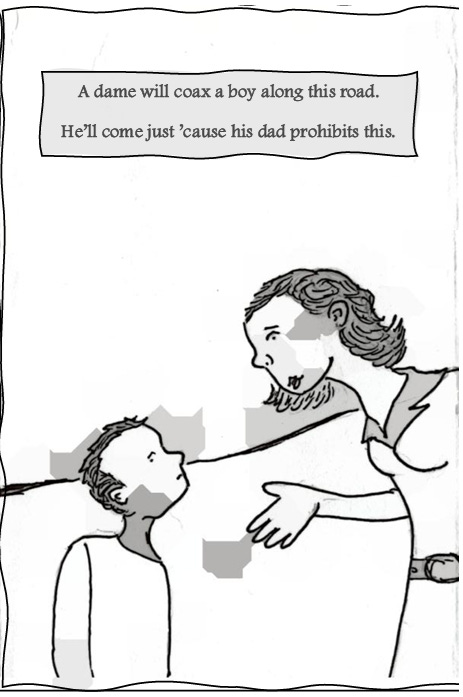

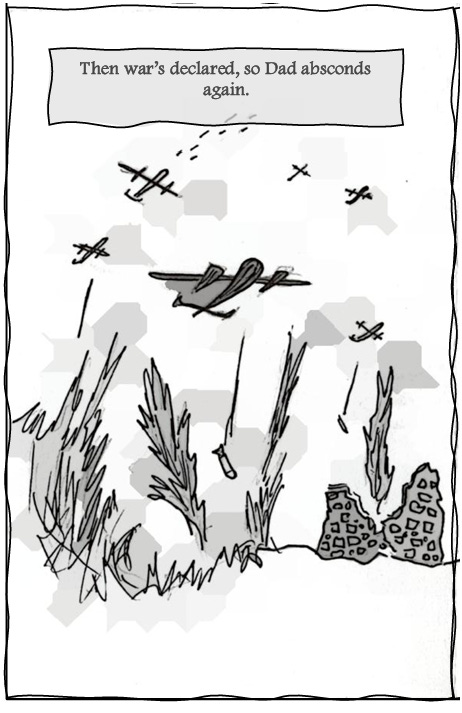
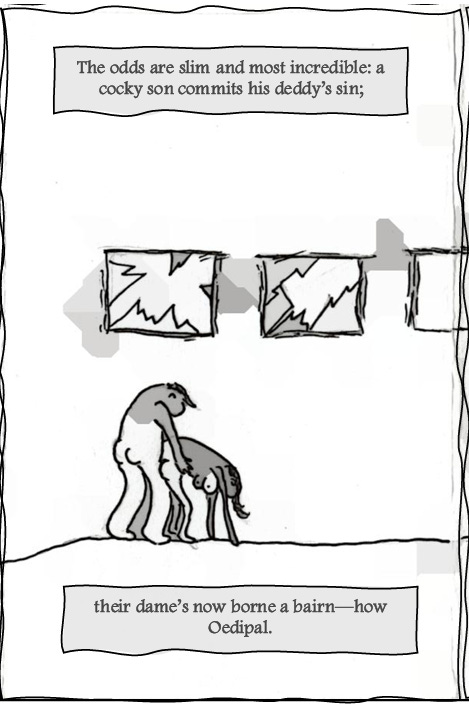
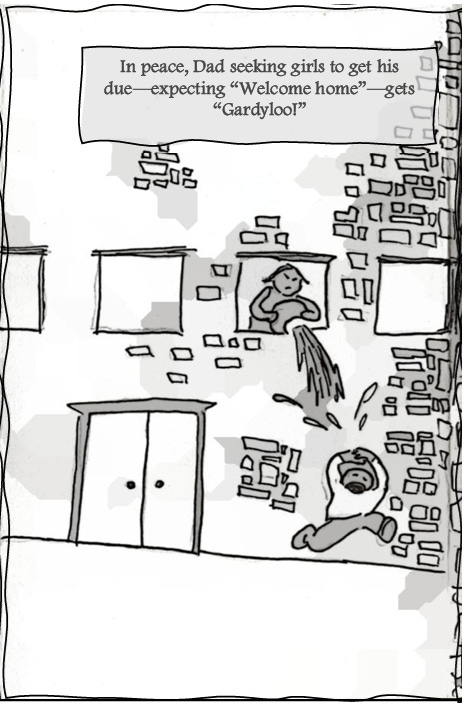
Scene 1: Youngsters and Their Hookers in Edinburgh during the Second World War
(1945. Scotland.)
Drunks lean against the walls like buttresses, then stagger down this claustrophobic close. They’re hunting alleyway seductresses who’re wearing naught but linen underclothes. A dame will coax a boy along this road. He’ll come just ’cause his dad prohibits this. His father has denied the seeds he’s sowed and claims, “You’re loved no more’n a pot o’ piss.” Then war’s declared, so Dad absconds again. The odds are slim and most incredible: a cocky son commits his deddy’s sin; their dame’s now borne a bairn—how Oedipal.
In peace, Dad seeking girls to get his due—expecting “Welcome home”—gets “Gardyloo!”
Scene 2: When Our Computers Achieve—and Then Exceed—Humanlike Consciousness, How Will We Play with Each Other Then?
(2021. Knoxville, Tennessee.)


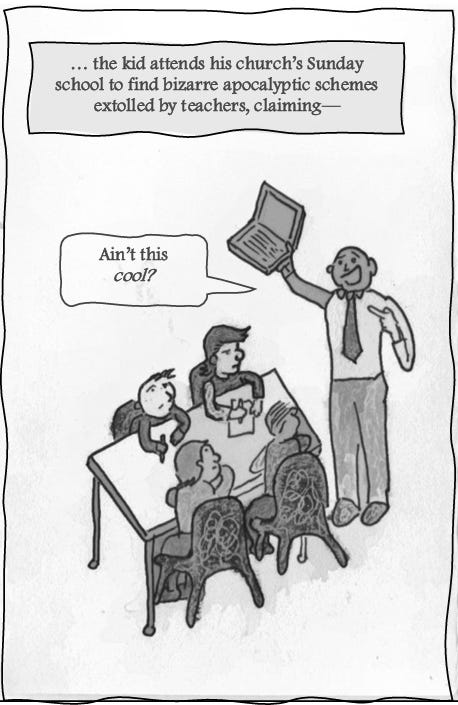






Scene 2: When Our Computers Achieve—and Then Exceed—Humanlike Consciousness, How Will We Play with Each Other Then?
(2021. Knoxville, Tennessee.)
Already haunted by AI bad dreams, the kid attends his church’s Sunday school to find bizarre apocalyptic schemes extolled by teachers, claiming—
Teacher: Ain’t this cool? Here on my laptop, people live in glee, like infants unaware that they will die. They wait for an omniscient deity to send them holy wisdom from on high. So take it home, this grand experiment, to give them laws and promises of bliss…
Straight to his closet, that machine is sent. The kid is old enough to say—
Kid: Fuck this.
He’s good enough to think, Infernal game. And then: Could I be subject to the same?
Scene 3: The Evolution of Evil Things from the Jurassic and the Cretaceous to Now and Forever
(A fable from the predawn of Time. Aboard a spaceship.)




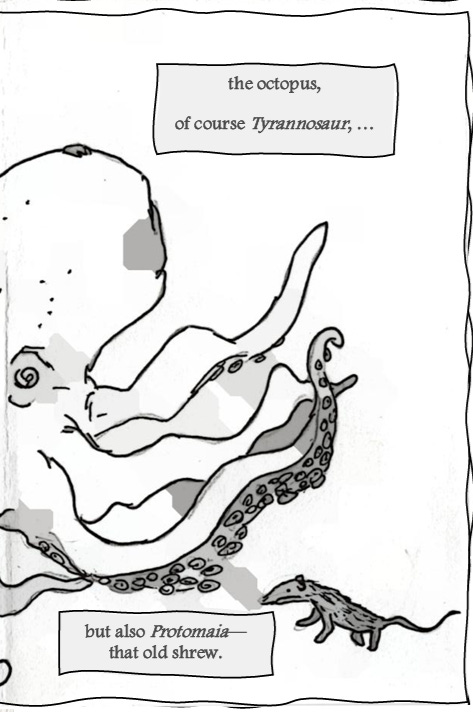
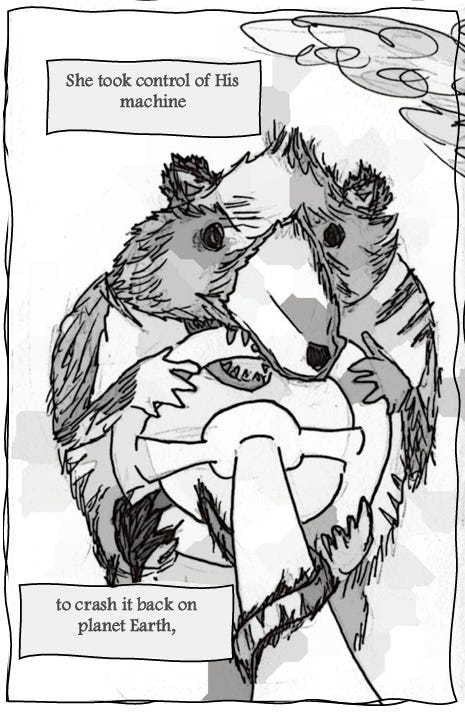
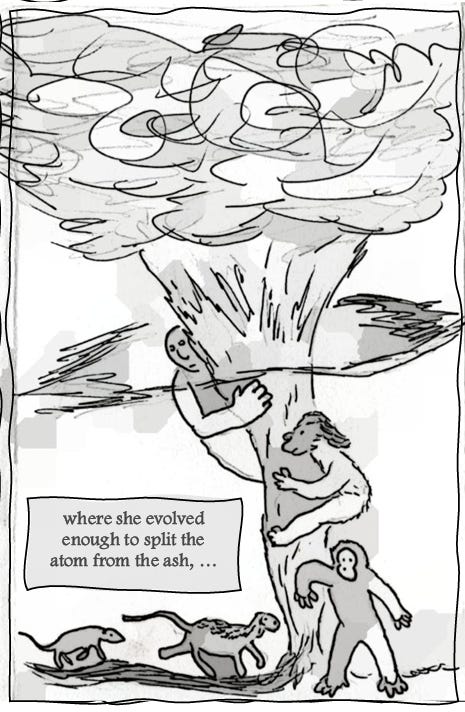
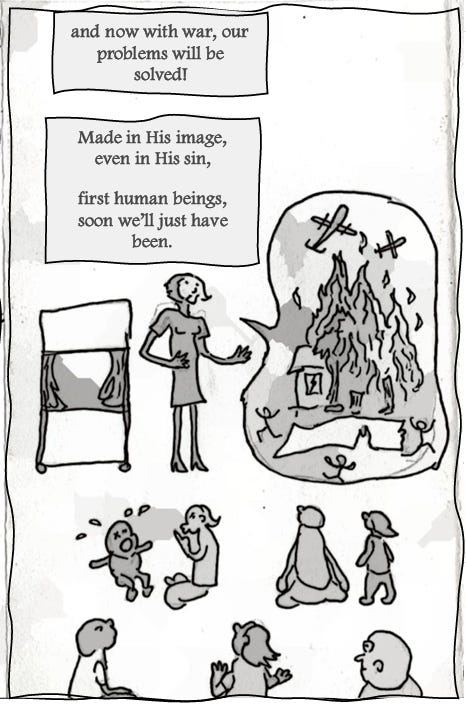
Scene 3: The Evolution of Evil Things from the Jurassic and the Cretaceous to Now and Forever
(A fable from the predawn of Time. Aboard a spaceship.)
From heaven, Gawd’s celestial doomsday bombs rained down with sounds like roars and shrieks and sighs. Whom did He spare? The givers of the alms? Forgivers of all wrongs? Perhaps the wise? His travelers in Time (of this, we’re sure) saved all the art that made Him proud He drew: the octopus, of course Tyrannosaur, but also Protomaia—that old shrew. She took control of His machine to crash it back on planet Earth, where she evolved enough to split the atom from the ash, and now with war, our problems will be solved!
Made in His image, even in His sin, first human beings, soon we’ll just have been.
Scene 4: The Egyptian Pharaoh Who Just Wished for Three Simple Things: Life Eternal, Food for All, and Lovers to Screw Him Forever
(c. 2566 BCE. Memphis, Egypt.)
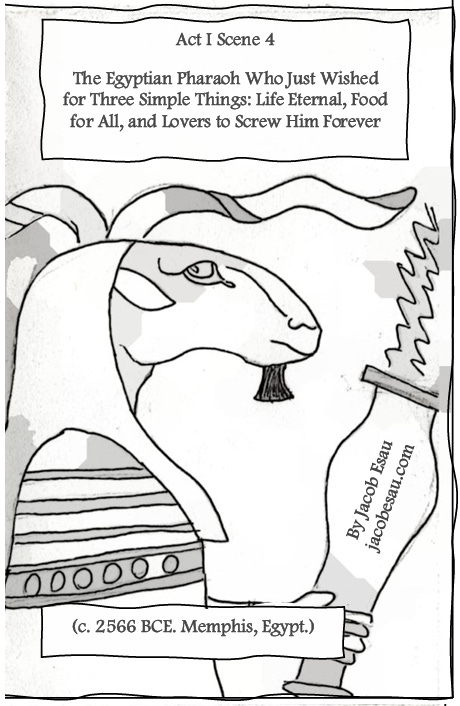
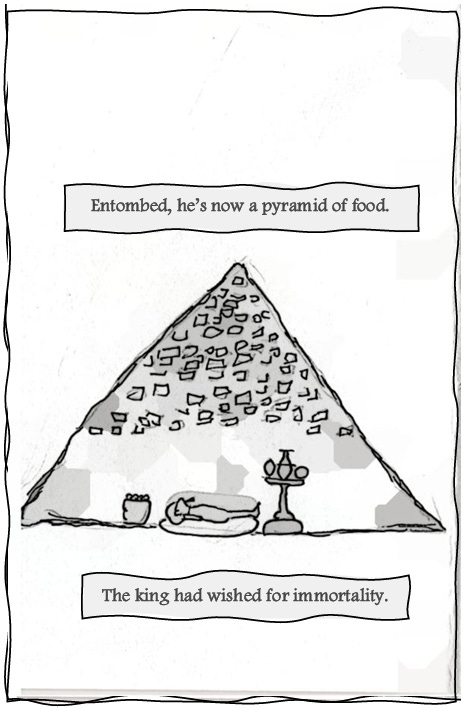
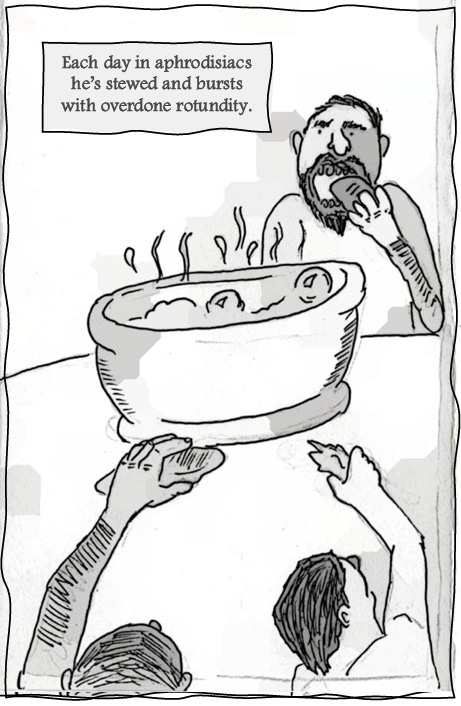
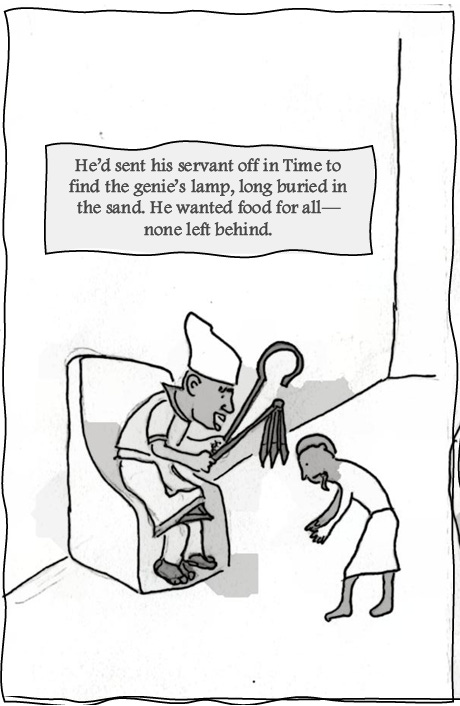

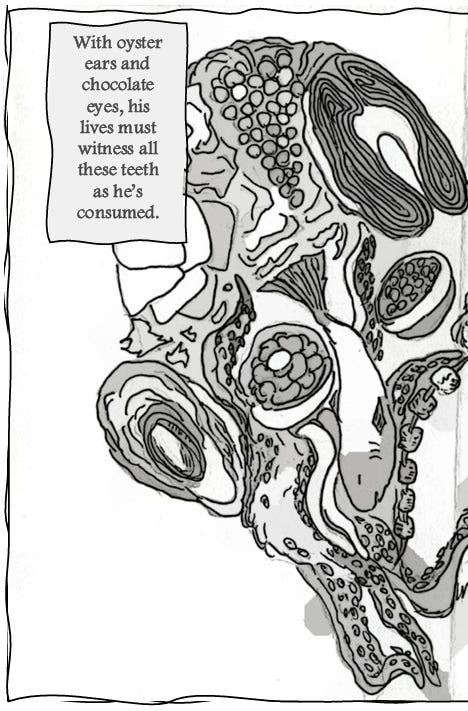
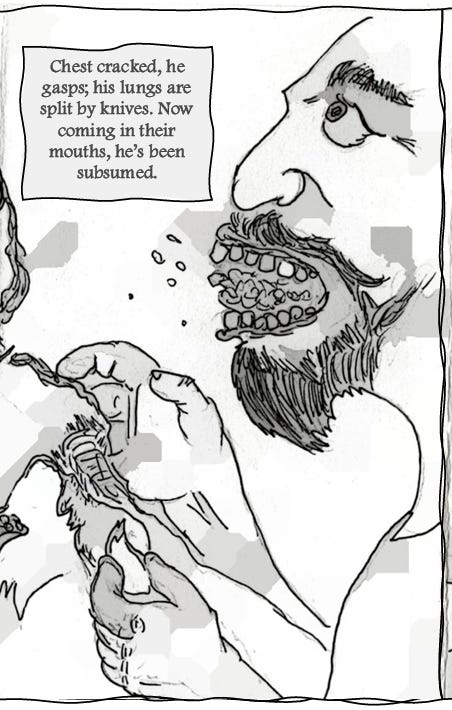

Scene 4: The Egyptian Pharaoh Who Just Wished for Three Simple Things: Life Eternal, Food for All, and Lovers to Screw Him Forever
(c. 2566 BCE. Memphis, Egypt.)
Entombed, he’s now a pyramid of food. The king had wished for immortality. Each day in aphrodisiacs he’s stewed and bursts with overdone rotundity. He’d sent his servant off in Time to find the genie’s lamp, long buried in the sand. He wanted food for all—none left behind. He’s reincarnated, not quite as planned. With oyster ears and chocolate eyes, his lives must witness all these teeth as he’s consumed. Chest cracked, he gasps; his lungs are split by knives. Now coming in their mouths, he’s been subsumed.
Last wish: these concubines’ wet lips slurp bones as they are led to bed—by pheromones.
Scene 5: The Apple Latchkey Kid
(2020. Knoxville.)



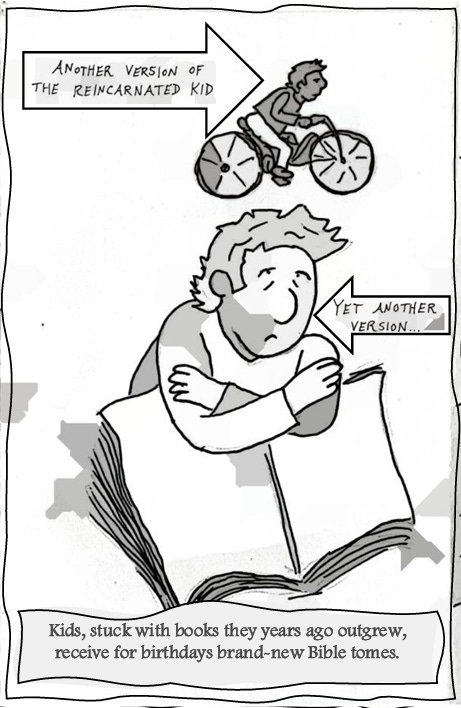
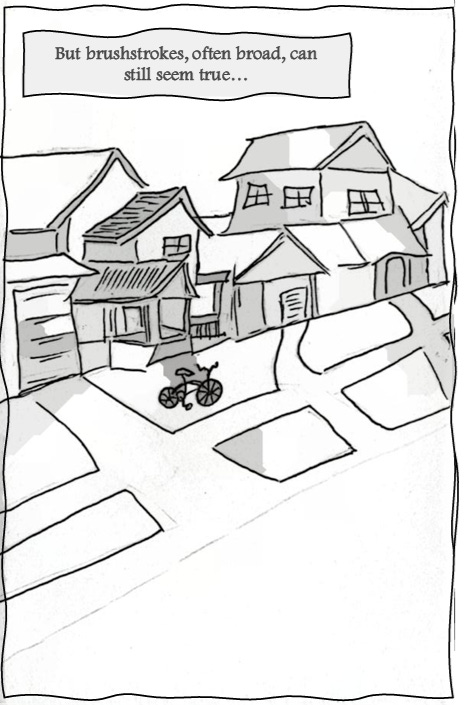
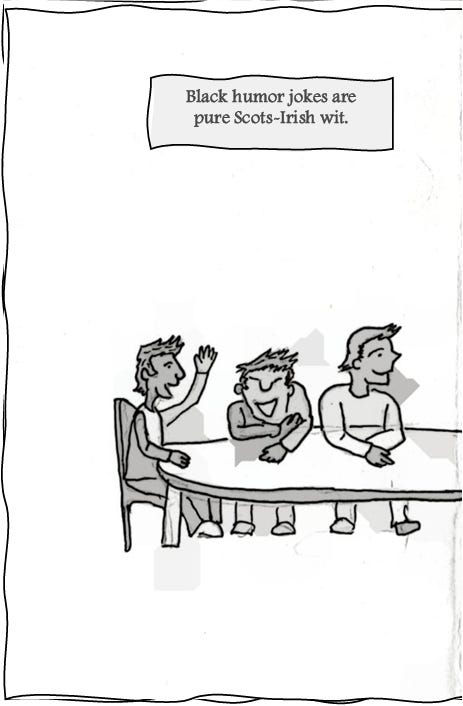



Scene 5: The Apple Latchkey Kid (2020. Knoxville.)
Beginning in his high school skeptic phase, he scoffs at how his Appalachia’s viewed, like dabs of watercolor-thin clichés… There’s threadbare furniture. A baby’s nude. Folks welcome y’all here to their mobile homes. Kids, stuck with books they years ago outgrew, receive for birthdays brand-new Bible tomes.
But brushstrokes, often broad, can still seem true… Black humor jokes are pure Scots-Irish wit. Some of these people sound like they rehearse off-color quips straight from a Shakespeare skit.
While carpetbaggers blame some foreign curse, it’s strange: blue mountains—treated like they’re dumps—have reddened with a rage that nothing trumps.
Dear reader,
If you’d like to read the rest of Book I now, please subscribe here, upgrade to the “Zinester” tier, and just pay what ya can.
Or click below if you’d like to read all of Book I for free and you don’t mind waiting. You can find a new post published each week:


